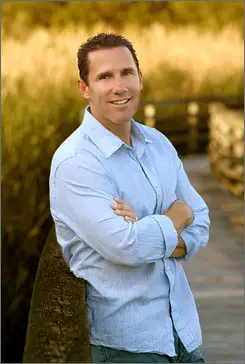Nicholas Sparks burst onto the literary scene in 1996 with his novel The Notebook. He is a classic case of the ten year in the making overnight success. The Notebook was actually his fourth book – though the first two novels were never published and the third was a little noticed, co-written, self-help book. His first three bestsellers along with the movie version of Message in a Bottle propelled Sparks to the top of the Bestseller list through all of the late 1990s – he continues to enjoy a comfortable perch on that list. Sparks is one of those writers whose books just scream for a film adaptation with seven so far having been turned into films.
If you’re a fan of Sparks’ books we’ve create a nice list of his books, in order below, for you.
Nicholas Sparks’ Books in Order
- Wokini (non-fiction 1995)

Nicholas Sparks - The Notebook (1996)
- Message in a Bottle (1998)
- A Walk to Remember(1999)
- The Rescue (2000)
- A Bend in the Road (2001)
- Nights in Rodanthe(2002)
- The Guardian (2003)
- The Wedding (2003)
- Three Weeks With My Brother (non-fiction 2004)
- True Believer (2005)
- At First Sight (2005)
- Dear John (2006)
- The Choice (2007)
- The Lucky One (2008)
- The Last Song (2009)
- Safe Haven (2010)
- The Best Of Me (2011)
- The Longest Ride (2013)
- See Me (2015)
- Two by Two (2016)
- Every Breath (2018)
- The Return (expected in late 2020)
Nicholas Sparks also offers some great advice on his website. Here’s a preview where he discuses the publishing business.
Publishing is a business. Writing may be art, but publishing, when all is said and done, comes down to dollars. Keep that in mind.
I say this because of the volume of mail I receive from unpublished writers who believe that “having a good story,” is enough to guarantee success.It’s not. I hate to say it, I wish it wasn’t true, but it’s not. Some of the best novels I’ve ever read never hit the best-seller list, then faded away before sadly going out of print. There are also some poorly written novels that do become best-sellers. Writing a great novel is the most important thing you can do to become a success, but sometimes it’s not enough these days.
Publishing has changed over the years. Charles Dickens was primarily a serial writer whose work appeared in magazines. Ernest Hemingway and F. Scott Fitzgerald worked with one of the great editors of all time (Max Perkins) and received a great deal of personal attention from their publishing houses, in addition to building their market through short stories. In the 1970s, the paperback market was much larger than it is now, providing a vehicle for young writers to build an audience (Stephen King, Nelson DeMille, Danielle Steel, Peter Benchley—- the paperback market was huge in their careers). Now, hardcover novels seem to be critical (for example, The Notebook, The Horse Whisperer by Nicholas Evans, Cold Mountain by Charles Frazier, and Absolute Power by David Baldacci were all bestsellers in hardcover as first novels). [Full Story…]
And to finish off – here’s the trailer to The Notebook.
.
